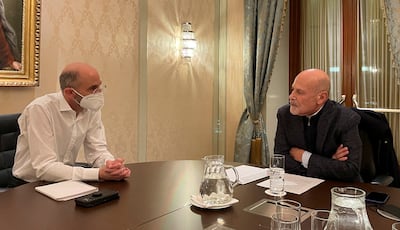US special envoy for Iran Robert Malley said on Sunday that a deal with Iran is unlikely unless four US citizens detained in the country are released.
"They are separate and we are pursuing both of them. But I will say it is very hard for us to imagine getting back into the nuclear deal while four innocent Americans are being held hostage by Iran," Mr Malley told Reuters from Vienna.
"So, even as we are conducting talks with Iran indirectly on the nuclear file, we are conducting, again indirectly, discussions with them to ensure the release of our hostages."
The four US citizens include Iranian-American businessman Siamak Namazi, 50, and his father Baquer Namazi, 85, both of whom were convicted of "collaboration with a hostile government".
Siamak remains in prison while his father was released on medical grounds in 2018 and his sentence reduced to time served. However, the elder Mr Namazi is unable to leave the country, according to his lawyer.
Environmentalist and co-founder of the Persian Wildlife Heritage Foundation, Morad Tahbaz, 66, is the third American detained in Iraq. Mr Tahbaz, who also holds British citizenship, was arrested in 2018 along with eight of his colleagues and was sentenced to 10 years in jail a year later.
The fourth is businessman Emad Shargi, 57, who was originally arrested in 2018. He was eventually released and banned from leaving Iran before being arrested once again.
In response to Mr Malley's comments, Saeed Khatibzadeh, spokesman for the Iranian foreign ministry said the issue of prisoners would not be tied to the nuclear talks.
"Iran has never accepted pre-conditions on the negotiations. We shouldn't make already complicated talks more complicated," he told reporters on Monday.

Indirect talks over Iran's nuclear programme between Tehran and Washington have been continuing in Vienna, with Russia, China, France, Germany, the UK and the EU taking part.
Iran and the US have both not complied with the Joint Comprehensive Plan of Action (JCPOA) since former US president Donald Trump pulled his country out of the deal and reimposed sanctions on Tehran, breaching the terms of the original deal.
Progress on the talks has been slow so far but there has been growing optimism surrounding the possibility of a deal being made. Asked if Iran and the US might negotiate directly, Mr Malley said: "We have heard nothing to that effect. We would welcome it."
Mr Khatibzadeh continued to voice optimism from the side of Iran saying on Monday the talks are "on the right track."
Russia's ambassador in Vienna met Iran's top negotiator Ali Bagheri on Sunday to go over notes from the last week of meetings. Mr Bagheri also met the EU's Enrique Mora before the broader session at the Palais Coburg in Vienna.
While no formal deadline has been set, negotiators have indicated that talks could end over the next couple of weeks.


